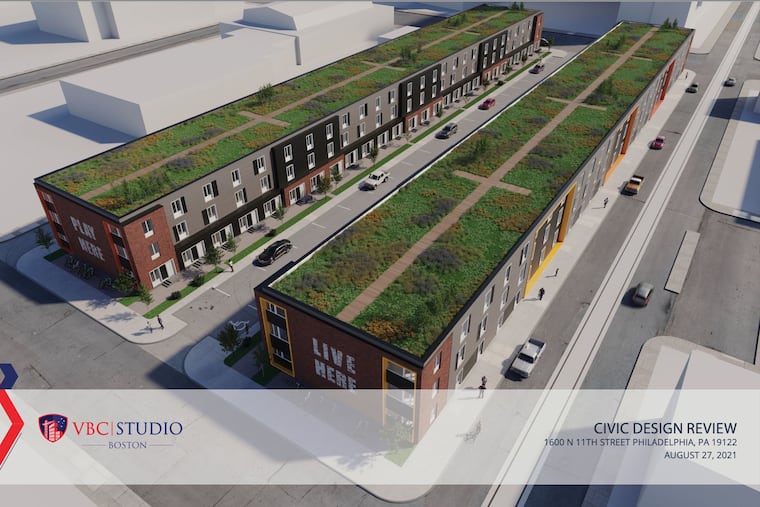Civic Design panel tells developer of student housing near Temple University: Go back to the drawing board
The Civic Design Review committee voted unanimously Tuesday to tell a developer of student apartments near Temple to come up with a better design.

The city’s Civic Design Review panel has told the developer of a proposed student apartment complex near Temple University to come up with a better design and that the plans offer little to the community.
The project has been opposed by some residents of the nearby Yorktown and Jefferson Manor neighborhoods, who say that it will disrupt their mostly single-family home neighborhood, contribute to parking woes in the area, and eventually mean many of the predominantly Black residents will no longer be able to afford to live there.
The proposal faced the Civic Design Review panel at the city Planning and Development Department on Tuesday to evaluate the appropriateness of the design.
Panel members voted unanimously to ask the developer to start over and produce a new design for the current proposal of a 320-unit apartment complex at 1600 N. 11th St.
‘If I woke up here, I would think I had been kidnapped’
At the meeting, the panel had a lot to say about the apartment complex that is planned for a parking lot, next to Bright Hope Baptist Church.
The lot takes up an entire city block and stretches along 11th Street between Cecil B. Moore Avenue and Oxford Street.
The developer, 1600 N. 11th Street CRCP LLC, and the architectural firm, VBC Studio, of Boston, submitted a rendering for two rows of three-story apartments.
Neighborhood critics had described the structure as looking like “army barracks.”
A public commenter who tuned in to the panel’s Zoom meeting Tuesday called the design “bizarre” and said it “looks like shipping containers, elongated and fitted with windows.”
While noting the panel is generally “pro-development,” Dan Garofalo, vice chair of the panel, said he could find almost nothing positive to say about it.
“This is a sad project,” Garofalo said. “No one would want to live near this project. No one would want to live in this project. These are clearly student dormitories. But if I woke up here, I would think I had been kidnapped. The units are tiny. I’ve never seen apartments this tiny.”
Garofalo, an architect and senior adviser at Econsult Solutions Inc., told the developer to take time to look at other apartments in Philadelphia and get an idea of what fits into the “vernacular architecture” of what makes Philadelphia, well, Philly.
He even suggested it look at the suburban-style townhouses and apartments in the Yorktown neighborhood just south of the proposed development.
Complex intended as a ‘transition’
VBC Studio architect Sara-Ann Logan said the plan for two horizontal rows of apartments was intended to serve as a transition between the much taller high-rise apartments north of Cecil B. Moore Avenue on the Temple campus and the smaller two-story suburban-styled townhouses in the Yorktown neighborhoods south of Oxford Street.
She said 316 of the 320 units would be studio apartments and four would be two-bedroom apartments.
David Sims, another commenter from the public, who identified himself as a Temple student studying city and regional planning, also criticized the design:
“It doesn’t provide any connection to the public,” he stated. He said aspects of the design could “add too many conflict points” with the surrounding neighborhood.
Michael Johns, an architect and the chair of the panel, suggested the developer have more discussions with community members.
He criticized plans to store two dumpsters on Marvine Street, a narrow street between the proposed apartments and Bright Hope Baptist Church: “Trash bins in the street are not acceptable,” he said, adding that the dumpsters would encourage “short dumping” of garbage and other trash.
“There is a huge opportunity to create some amenity space for the community,” Johns said. “I think the development really has to step back and reevaluate.”
» READ MORE: Town vs. Temple: Yorktown residents fight to keep students from quiet neighborhood near university
Neighborhood opposition
Paula Peebles, who lives in Jefferson Manor, a neighborhood adjacent to Yorktown, and Faye M. Anderson, a public historian and preservationist, each testified that the apartments were not a good fit for nearby residences.
Anderson noted that Yorktown is on the National Register of Historic Places as an example of the first planned community by a private developer to provide suburban-styled housing opportunities for Black Americans.
A group of residents that have been fighting the project have also raised concerns about possible environmental hazards. However, the meeting did not address those concerns.
» READ MORE: Yorktown residents take issue with student renters
More than a century of industrial use at the site could mean there are environmental concerns.
Since 1862, the parking lot has been home to a brewery, industrial laundry, and auto repair business, Anderson said, with the records of the on-site brewery dating back to as early as 1848.
Peebles and Karen Warrington, another neighbor of the project, wrote to U.S. Rep. Brendan Boyle, asking for the Environmental Protection Agency to investigate for hazardous contamination there. Boyle followed up with a letter to the EPA but had not received a response, his aide said.
Michael Mattioni, a lawyer for VBC Studio, did not respond to an email request for comments on the design review panel’s vote.